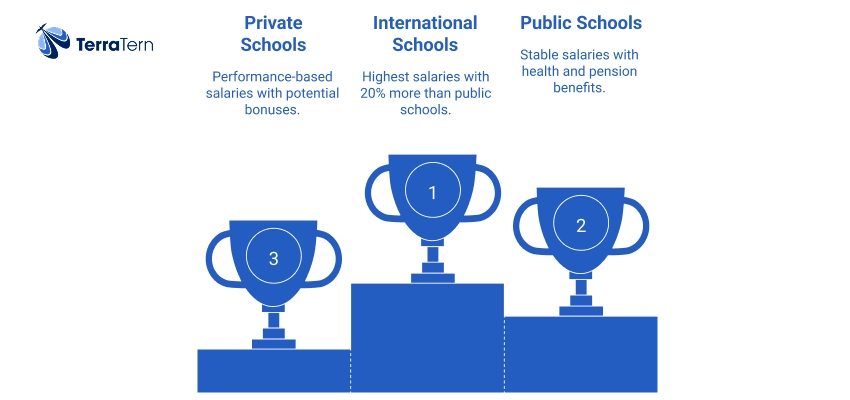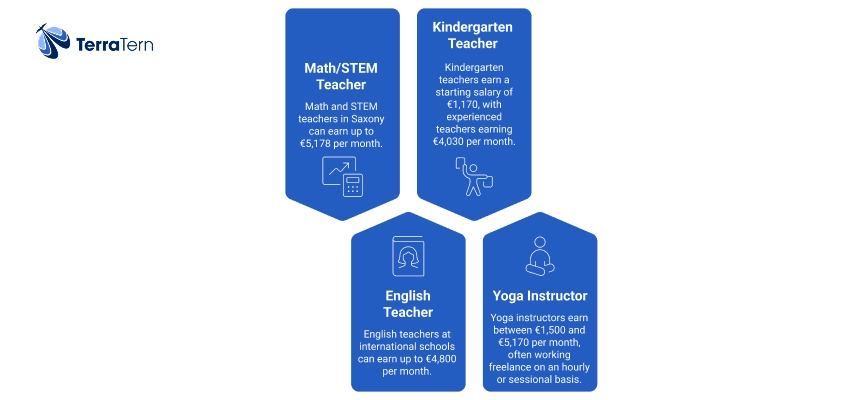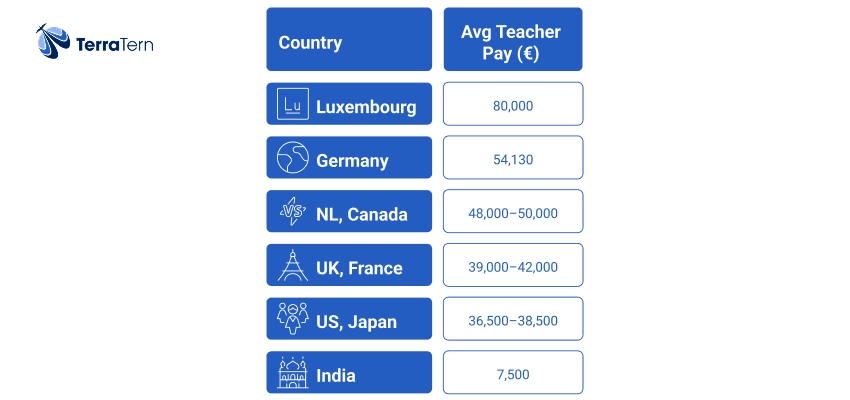Key Highlights
Germany's education is well-regarded, and the teacher salary Germany demonstrates the country's commitment to quality education. By 2025, teacher salary Germany continue to evolve and increase due to changes in policy and economics, leading to an increasing demand for teachers. Public school teachers benefit from set pay scales, whereas in private schools, performance-based incentives apply.
Teacher salary Germany differ depending on experience, subjects taught, and regulations for the state where the school is situated. An increase in wages for STEM, early childhood, and international education means that in 2025, teaching in Germany will likely be a very attractive option. The guide looks into the job market and trends around teacher remuneration, compares the different sectors, and shares what teaching looks like in Germany in 2025.
Latest and Facts News About Teacher Salary Germany
-
Public School Budget Increase: Germany recently raised its public school budget by 5% to improve educational resources and teacher salary Germany.
-
Salary Competition in Berlin: Teachers in Berlin Grammar Schools with over 20 years of service are now being paid approximately €5,000 each month.
-
Equal Pay Directives by the EU: The new European Union directives say that kindergarten teachers have to be paid equally in all Federal States and will allow some levelling in early teacher salary Germany by 2026.
-
Increased Salaries of Internation Schools: The teacher salary Germany of international school teachers within Germany have reportedly been 20% higher than they were during the preceding years, leading to English teachers making upwards of €4,800 in pay provided they can secure employment.
-
STEM Teacher Salary in Saxony: Math teachers in Saxony earn €5,178 per month the highest STEM-related teacher salary Germany in Germany.
Average Teacher Salary Germany: Key Insights
Returning teachers in Germany are offered different teacher salary Germany depending on the federal state, type of institution (public or private), subject specialisation, and years of experience. This is a very intricate and thoroughly analysed one that helps build a broader view of the salary landscape.
Also Read: Doctor Salary in Germany: Latest Salary Guide from Experts
Public Teacher Salary Germany (2025)
Public school teachers' salaries in Germany are determined by the policies of the respective federal state and teacher qualifications. Below is a breakdown of the starting teacher salary Germany and those for 20 years of experience:
|
State |
Starting Salary (Germany) (€) |
20-Year Experience (Germany) (€) |
Starting Salary (INR) |
20-Year Experience (INR) |
|
Baden-Württemberg |
3,465 |
4,184 |
3,12,000 |
3,76,000 |
|
Bavaria |
3,365 |
4,169 |
3,03,000 |
3,75,000 |
|
Berlin |
4,544 |
5,000 |
4,09,000 |
4,50,000 |
|
Brandenburg |
3,322 |
3,997 |
2,99,000 |
3,60,000 |
|
Bremen |
3,327 |
4,006 |
2,99,500 |
3,61,000 |
|
Hamburg |
3,478 |
4,378 |
3,13,000 |
3,94,000 |
|
Hesse |
3,123 |
4,188 |
2,81,000 |
3,76,500 |
|
Mecklenburg-Western Pomerania |
3,145 |
4,298 |
2,83,000 |
3,86,500 |
|
Lower Saxony |
3,183 |
4,042 |
2,86,500 |
3,64,500 |
|
North Rhine-Westphalia |
3,459 |
4,156 |
3,11,500 |
3,73,500 |
|
Rhineland-Palatinate |
3,117 |
3,950 |
2,80,500 |
3,56,500 |
|
Saarland |
3,156 |
3,981 |
2,83,500 |
3,59,000 |
|
Saxony |
3,442 |
5,178 |
3,10,000 |
4,65,500 |
|
Saxony-Anhalt |
3,204 |
4,379 |
2,89,000 |
3,94,000 |
|
Schleswig-Holstein |
3,335 |
4,018 |
2,99,500 |
3,62,000 |
|
Thuringia |
3,225 |
4,086 |
2,91,000 |
3,68,500 |
Private vs. Public Sector Comparison for Teacher Salary Germany

Teacher salary Germany vary in public and private institutions:
-
Public Schools: €3,500-€5,459 per month (includes health insurance and pension contributions)
-
Private Institutions: €2,500-€4,800 per month (performance-based bonuses included)
Math Teacher Salary in Germany
STEM teachers, especially math teachers, get paid more due to the subject being specialised. Here’s the breakdown of math teacher salary in Germany based on experience:
-
Entry-Level: €1,590-€3,450 per month
-
Mid-Career (5-10 years): €4,400-€5,178 per month
-
Top Earners: In STEM-focused states like Baden-Württemberg, it can go up to €5,480 per month
The math teacher's salary in Germany changes yearly according to the economy.
Yoga Teacher Salary in Germany
The wellness industry is growing, so yoga teacher salary in Germany are also growing:
-
Average Salary Range – Depending on experience, type of employment, and location, yoga teachers earn between £1,500 and £5,170 per month in Germany. The average monthly salary nationwide is thought to be about £3,250.
-
Freelance vs Studio Employment – Freelance yoga instructors usually charge between £30-80 per session, resulting in inconsistent income; on the other hand, those working at fitness centres or wellness studios receive a set monthly salary ranging from £2,000 to £4,500.
-
Specific Differences for Cities – Full-time yoga instructors in Berlin and Munich earn over £1,760 a month after taxes due to their increased demand and better clientele.
-
Specialization & Experience Effects – Yoga instructors who have specialised in areas such as prenatal, therapeutic, or corporate yoga have generally earned higher pay for their services and are able to get long-term contracts with resorts and wellness centres.
Also Read: Radiologist Salary in Germany: Latest Expert's Guide
Kindergarten Teacher Salary Germany
Early childhood educators are crucial, and so are their salaries:
-
Starting Salary: €1,170-€2,540 per month
-
Experienced (10+ years): €3,500-€4,030 per month
Editor's Note: In Munich, teachers get additional benefits like €270 per month childcare allowance

English Teacher Salary Germany
For TEFL-certified professionals, opportunities vary in institutions:
-
Language Schools: €1,500-€2,000 per month
-
Universities/International Schools: €3,000-€4,800 per month
Sanskrit Teacher Salary in Germany
Sanskrit teaching is a somewhat rare profession in Germany that is restricted primarily to universities, research institutions, and specialised cultural or language centres. There is no graded payment structure for Sanskrit teacher salary in Germany, and therefore, the earning varies depending on the academic qualification, institution, and experience. Let's look at Sanskrit teacher salary in Germany:
|
Institution Type |
Monthly Salary (approx.) |
Monthly Salary in INR (approx.) |
|
University Lecturer/Professor |
12,314 – 13,064 |
1,108,260 – 1,175,760 |
|
Private Tutor (Freelance) |
2,000 – 4,500 |
180,000 – 405,000 |
|
Language & Cultural Centers |
3,000 – 5,000 |
270,000 – 450,000 |
|
Secondary School (Private/International) |
2,500 – 4,000 |
225,000 – 360,000 |
How Germany’s Teacher Salaries Compare Globally?

When comparing teacher salary Germany internationally, Germany stands out:
|
Country |
Average Salary (per year) (€) |
Average Salary (per year) in INR (approx.) |
|
Luxembourg |
80,000 |
7,200,000 |
|
Germany |
54,129 |
4,870,000 |
|
Netherlands |
50,000 |
4,500,000 |
|
Canada |
48,500 |
4,365,000 |
|
Australia |
47,000 |
4,230,000 |
|
United Kingdom |
42,000 |
3,780,000 |
|
France |
39,000 |
3,510,000 |
|
United States |
38,500 |
3,465,000 |
|
Japan |
36,500 |
3,285,000 |
|
South Korea |
35,000 |
3,150,000 |
|
Spain |
33,000 |
2,970,000 |
|
Italy |
31,000 |
2,790,000 |
|
India |
7,500 |
675,000 |
Requirements to be a Teacher in Germany
To become a teacher in Germany you need to meet specific educational and professional requirements. The process varies depending on the school type (public, private or international) and the subject. Here are the key requirements for teaching in Germany:
1. Academic Requirements
-
Bachelor’s degree (BA/BSc) for entry-level positions.
-
Master’s degree (MA/MSc/M.Ed.) for secondary school teachers and university lecturers.
-
For vocational and technical education, a degree in a specialised field with additional teacher training.
2. Teacher Training (Referendariat)
-
Teaching in public schools requires teacher training (Referendariat), a two-year state-supervised practical training.
-
This includes classroom teaching experience with senior teachers.
-
At the end of the program, you will need to pass the Second State Examination (Zweites Staatsexamen) to become a full-time teacher in Germany.
3. Language Requirements
-
For public and German-medium schools, you need C1-level German (according to the Common European Framework of Reference for Languages - CEFR).
-
For international and English-language schools, you may not need German but often require native or near-native English with TEFL, TESOL or CELTA for English teachers.
4. Additional Certifications
-
TEFL/TESOL/CELTA for English teachers in international or language schools.
-
Specialised teaching licenses for vocational training and technical subjects.
-
State Teaching License (Staatsexamen) for those who want to teach in public schools.
5. Work Authorisation and Residence Permit
-
Non-EU teachers need a work visa and a residence permit to teach in Germany.
-
The Blue Card EU is an option for highly qualified non-EU teachers with a salary above the government requirements.
Also Read: Is IELTS Required for Germany?
How to Become a Teacher in Germany?
Becoming a teacher in Germany involves the following steps:
Step 1: Get the required Academic Qualification
-
Get a Bachelor’s degree in education or the subject.* For higher education teaching, a Master’s degree or Ph.D. might be required.
Step 2: Complete the Teacher Training Program (Referendariat)
-
Enroll in a teacher training program (mandatory for public school teachers).
-
Get hands-on classroom teaching experience under supervision.
-
Pass the Second State Examination (Zweites Staatsexamen).
Step 3: Get the necessary Language Skills
-
Public school teachers must achieve C1-level German.
-
International school teachers should have TEFL, TESOL or CELTA for English teaching.
Step 4: Apply for Teaching Positions
-
Look for vacancies in public schools, private institutions or international schools.
-
Use school websites, education job portals and government listings to find the right openings.
Step 5: Get a Work Visa (For Non-EU Citizens)
-
Get a work contract from a recognised school or institution.
-
Apply for a German work visa and residence permit.
-
If eligible, apply for the EU Blue Card for easier residency.
Step 6: Start teaching in Germany
-
Once all requirements are met, teachers can start their careers in primary, secondary, or higher education institutions.
-
Continued professional development is encouraged through workshops, certifications and further studies.
Conclusion
Teaching in Germany is a respected and secure profession with teacher salary Germany varying by state, subject and experience. In 2025 public school teachers will still get competitive salaries and private institutions will offer performance-based bonuses. Opportunities are growing in STEM, English-language and vocational education attracting both domestic and international educators.
For aspiring teachers fulfilling the academic, linguistic and legal requirements is crucial. Whether you want to teach in public schools, private institutions or international schools, Germany is one of the most popular destinations for teachers worldwide.
To learn more about the German job market, visit Terra Tern!






